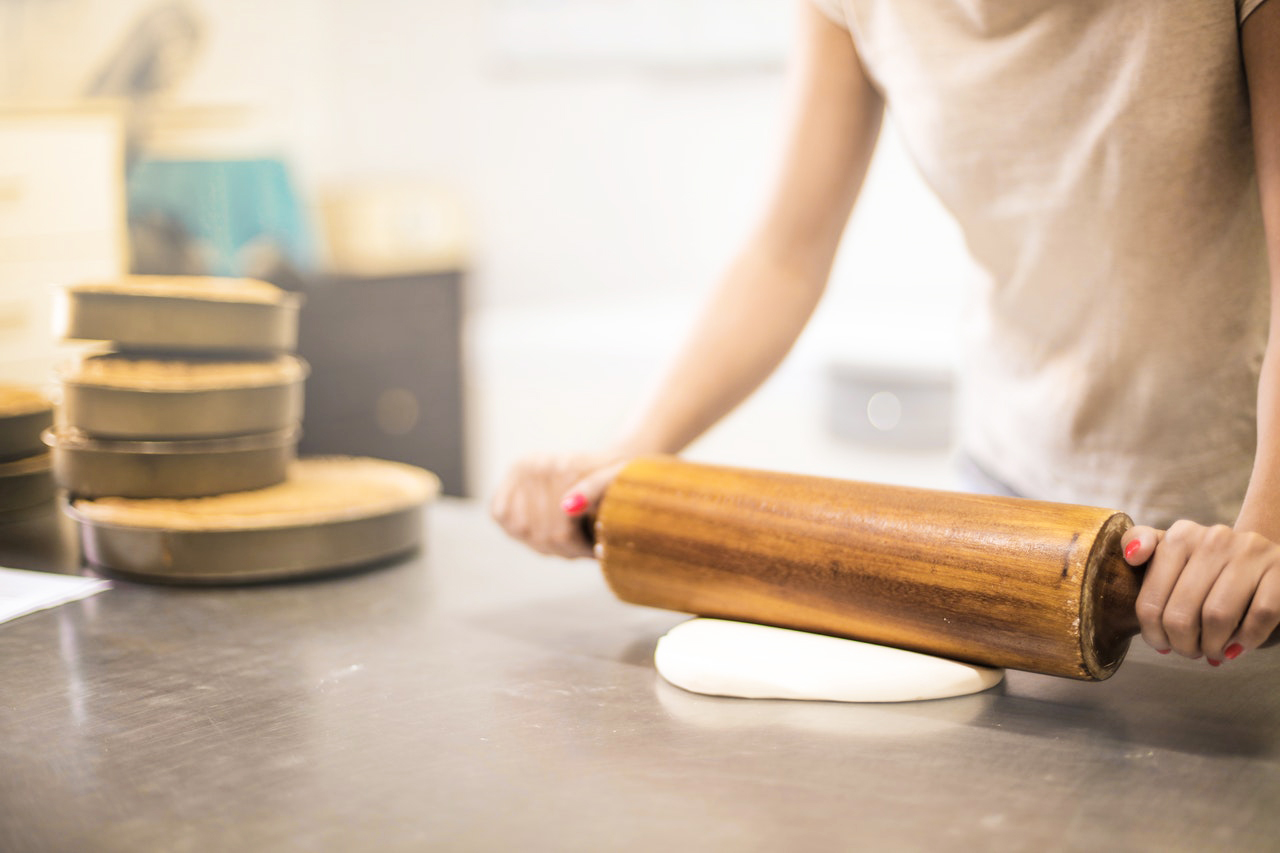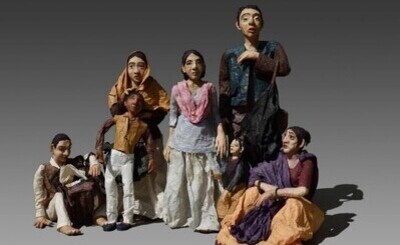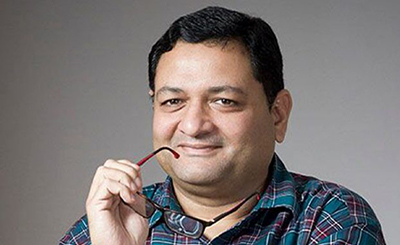
Big brown boxes lie uncertainly about 903 as she takes a quick peek into the opened door. The walls are no longer orange with white patterns but whitewashed — a newly undressed bride, vulnerable and needy, waiting on her man to approve of her and her body.
Kulsum walks silently into the front room, stepping over the boxes. A packet of paratha and achar with oil dribbled over the floors, a jumble of cobwebs and wires littered about, books and vessels, an odd shoe with a golden band, a broken umbrella. A few pieces of furniture taped in bubble wrap. Kulsum longs to pop the bubbles between her fingers. But she daren’t. Not yet. This wasn’t her place. Everything seemed unusual, and 903 seemed overwhelmed at the sight of it. A wooden rolling pin suddenly rolls out of the box, and Kulsum bends to pick it up — silently appraising it. She loved rolling pins — the slender bodies with a bulging stomach and long toenails. She’d had a relationship with rolling pins since she was 12.
Her Ammi said she could always tell about a person by the state of her belan or rolling pin in their kitchens. Her Nani’s was stubby and short and yielded a thick burnt roti cooked over an open flame. Her first rolling pin had been fat and wooden and felt too big in her palms. Her Ammi made soft and fluffy rotis — with her lean steel rolling pin. Kulsum had spent three hours at a market last year choosing her pin, before taking it up to the counter.
She rubs this pin against her gauze pink dupatta, breathing in the smell of familiarity and uncertainty. This pin felt like a child in her arms — perhaps used just a handful of times. Small and wooden with a sticker intact. A novice. Slobbered against the runny dough. A pin that hadn’t experienced its joys of making rotis. Kulsum closes her eyes as she cradles the pin against her.
“Excuse me,” calls out a voice, and she drops the pin with a start. It clatters to the floor. A man stands at the doorway, his arms are laden with books and a lopsided dish antenna. He looks at her warily as she gathers herself hurriedly, pulling down her dupatta and straightening up.
“I’m Kulsum. I used to be the maid in this apartment — until a month ago, when the tenants left. I even cleaned up the place for the landlord. You see, I came back to look for something I left behind,” she rambles on breathlessly, as the man takes a deep breath and heaves the antennae onto the floor with a grunt. He was tall and thin but with well-developed arms, a wiry crop of hair, and a face that was mostly covered by a beard. She couldn’t really see much of him because of the beard. In joggers and a shirt with the sleeves rolled up, he seemed young — in his late thirties. Kulsum quickly notices a tattoo and his ringless fingers. This should be quick.
“Would you require a maid?” she asks him tentatively, picking up the fallen rolling pin and hugging it to her chest. “I’ve worked in this apartment for thirteen years now — this was my first house ever. I can cook, clean, do the washing, just not the bathroom, but I can even help you set up the home”. She bites her tongue. She knew she was getting carried away, but he didn’t realise how important this was for her.
The man appraises her for a moment too long. “As you see, I’ve just moved in. It’s a mess here. Why don’t you come back in a couple of days, and we can talk then.” A hand is raised and shown her the door.
“Of course, thank you, Bhai saab,” Kulsum said gingerly, putting the pin down, rubbing it quickly for good luck, and walking to the door. “If you need food over the next few days, I can bring some. I make very good keema…” the door shuts gently in her face as she stands mid-sentence. She’ll have to come back in a few days.
She runs her fingers on the yellow door before quickly walking the two floors upstairs for her 11 am at Sunayan’s house. Sunayan was a single woman who lived in 1103. Kulsum cooked Malwani lunches for Sunayan. Gassi with her pick of vegetables, mutton curries in peppers on Saturdays, some rawa — fried fish to go with rice on weekdays, and her special Malwani fish curry for the occasional treat days. She helped her around the house, helped her grate coconut shells for her chutneys, peel eggs for dinner, and for their daily chai at 11 am. Sunayan was her friend, if she may cautiously say so. She’d lost her husband to an accident some years ago and had inherited his apartment and an insurance benefit to boot. Sunayan didn’t have to worry about work or spoiling her nails, which were always painted a deep maroon. She spent the day reading, doing breathing exercises, and meditations that seemed to take up most of her day. She’d heard Sunayan used to be an IT engineer before fortune hit her, but she daren’t ask. She was happy with the beauty tips and gossip that beautiful Sunayan gave her, while they steeped their rusk and camaraderie in cardamom chai.
She walks in and puts on the vessel for some tea. She could hear Sunayan breathing deeply as the water simmered rhythmically to her intervals as crushed ginger, sugar, and tea leaves danced their way into the pot. Eventually, Sunayan walked in. She picked up the tea, inhaled in its steam, and smiled at Sunayan.
“There’s a new tenant in 903,” she said, while squatting on the floor with her cup.
“That explains the smile, and the extra sugar in today’s chai.” Did you get the job? I know you’ve been short this month.
“No, he said he’ll get back. Single man, too many boxes, an open plate of paratha, there were pickle spills everywhere. I didn’t see a woman. It all looks different. White walls and wires everywhere,” she stirred her frustration into the teacup.
“Don’t worry. Let him settle down. It’s going to be no different this time. You always get 903. I’ll tell watchman Babu to put in a word for you.” A reassuring pat, a tinkle of anklets as she walked out of the kitchen.
“I don’t know… he doesn’t look like he wants a maid. The eating-out types. Pizza, cookies, and black coffee. I can’t even make all that”. A doleful sip, as she gets to her feet.
“Don’t worry. No one does without a maid in that house. You’ll learn like always. I will chant for you 108 times today, and you’ll get the job. A beam of faith inside an empty cup handed over to rinse.
Kulsum smiles as she sets to wash away the dregs and goodwill, as Sunayan resumes her breathing exercises. She hopes Allah listens to Sunayan’s prayers. It’s all she seems to do all day. Someone was bound to listen.
Sunayan’s prayers seem to have worked because four days later, the man at 903 met her by the lifts as she waited by it, playing with a string of jasmine flowers entwined in her hair. He came up and cleared his throat.
“Kal se kaam pe aa sakte ho? (can you come to work from tomorrow?),” he asked in broken Hindi.
“I speak English, Bhai saab. Yes, tomorrow.” She smiled.
“Okay, sweeping, dusting, and my meals. Simple meals, not too many spices. I will pay you as per society standards.” He runs his hands through his hair uncertainly. Rs 4,000?
“Okay, sir. Keys? That way, I won’t disturb you when I come in and out.” Kulsum holds out her hand.
He looks doubtful, then says, “Tomorrow.”
The next morning Kulsum woke early. She raced through her chores, packed keema rotis for her ‘aaho’ (she daren’t call her husband by name!), and spent an hour getting ready. She wore her favourite pink salwar, with its bright sequined dupatta and tucked a rose under her hair. She felt good. Then grabbing her purse and a rose petal strung through a pink thread for good luck, she walked briskly towards Woodland Heights, her anklets humming a happy song.
Her heart raced as the lift stopped on the ninth floor, and she walked the familiar carpeted floor into 903. A loving caress of the door, her pink against its yellow now peeled off its stickers the former tenant had put up. The house seemed susceptible to her. She took a deep breath and rang the bell — the happiest sound, ding-dong , a deep rumble — unlike the flats on other floors, she loves the sound of this bell.
Her hands linger on the switch a second longer. Longingly.
And then he opened the door. She had almost forgotten what he looked like — tall, too tall. And thin. He was wearing shorts and an old T-shirt and looked sleepy. She’d woken him.
“Good morning Kulsum ji, everything is all over the place. But you know where the kitchen is. You can start now; I’ll be out after a shower.” Still sleepy, he traipses back into the bedroom. It had once belonged to the Mehtas who had painted it green and let on thick red drapes to keep the neighbours out, and then there were the Iyers, the Madrasis who made her mop and sweep twice a day because of hygiene. That had gone on for five years. She knew every part of this floor so well from the mopping. Then the Punjabis had come, and the house always smelt of white butter and ghee. Mrs Punjabi had taught her how to make ghee. Those five ghee-filled years. Kulsum never had to buy butter or ghee for her house. Mrs Punjabi gave her enough that she could split some with Sunayan too. Then they had to leave, and Mr and Mrs Prem came in. They were an odd couple. The house was always silent except for when they lit the evening lamp, but Kulsum kept it alive by sputtering ghee with mustard seeds to ward off evil vibes. After them came a young working couple from Delhi. The man was nice, and even offered her strong black coffee (which she infused with three spoons of sugar) while she swept. The woman slept a lot, curled up in big blankets. However, she did a lot of bedecking — on the walls, paintings, lamps — the stickers on the door being prime examples. They had been decent to her. They gave her a computer-set for her son Hameed, and a salwar piece for her daughter Rukhsana before they left.
Now the house was bare — yet to take on the character or shape of its new tenant.
Kulsum tentatively takes a quick tour. Bare walls wincing from a fresh coat of paint — a few forlorn nails, a bookshelf sighing in the corner, shifting boxes sellotaped away, forgotten. Sports shoes in three bright colours. Bits and bobs everywhere.
The sliding balcony was empty and devoid of the plants and the yellow swing. Empty, wanting, needy.
The house called out to her, and she hurried to the kitchen. First things first — she rummages in a box, takes out a worn iron pot, and pours out a spoon of ghee generously into it. In goes some curry leaves and mustards as her hands work on an onion and a dried coconut piece — dicing, slicing. The leaves sputter, and the coconut slivers and onions join them, and Kulsum stands back, breathing in the heady aroma of onions cooking in ghee as 903 soaks in it, remembering her. She cautiously takes out the rose and the pink thread and ties it on the nail by the door of the kitchen. A reassurance. A symbol of faith. The rolling pin nestled contently in the crook of her arms. It was time to get to know the pin better now.
She gathers dough, water and starts kneading. She can hear the shower run — the leaky tap in the blue bathroom hasn’t been fixed. It still squeals. The moist dough is now rested, and being rolled out. The pin winces as it moves over the dough, once, twice, her well-practiced hands moving over and over — the rolling pin in its perseverance.
In no time, lunch is ready. A simple dal tossed with moringa leaves Kulsum had plucked that morning and knotted into her dupatta, a mound of fluffy hopeful rice and three pulkas tucked obediently into a casserole. She watches him out of the corner of her eye, while she sweeps the house as he tucks into his meal, heartily, his fingers and mind probing the food hungrily.
Soon it is time to leave. Sunayan would be waiting. She gives the counter a final wipe and caresses the rolling pin.
She lingers by the door. Sunayan walks up awkwardly, a remote control in his hand. “Lunch was good,” he smiles.
“You’re out of vegetables. I can get some tomorrow, and some meat. I cook meat very well,” her voice a notch higher, the dupatta twirled tightly around her crossed finger.
“Sure! Here’s the money.” A thousand-rupee note is handed over. An odd shuffle. A distracted pause. On television, Dhoni scores a six. Kulsum waited for her strike.
“Was the food too spicy today? I like my food with lots of salt and pepper. My Ammi taught me that. Salt wards off evil, and pepper keeps illness away — old habits. Tell me how you want it? I can even make pizzas, burgers, Maggi noodles…” she knew she was rambling on.
“No, everything is perfect. You make what you want, the way your Ammi taught you.” Another pause and a peek back at the game.
“Do you want more money?”
“No, I only need the keys,” so I can come in and arrange everything without disturbing you,” the impeccable afterthought.
He pauses a minute too long, shrugs, and hands her a lone key — no keychain, no tags, but the familiar dented silver key.
Her fingers close around it.
“9 O clock tomorrow,” he smiles and closes the door.
She smiles at the yellow door. She was at home.
Kulsum hums under her breath as she walks into Sunayan’s house. She’s just finished her breathing classes, and her cheeks are flushed with exertion.
“Someone’s looking very nice today! Pink suits you, Kulsu, wear it more often. It is also the colour of good luck…” praises doled out over tea leaves and grated ginger.
Kulsum smiles as she cuts up lemongrass for the tea, her fingers still holding the little key to 903.
That night Kulsum couldn’t sleep. She stayed up longer than necessary, listening to her Ammi’s old radio, fingers entwined over the key. She went to the window, looking at the high-rises on a low hill that stood frowning down at her slum — she counted fifteen windows. Four to the right, three to the bottom, on the ninth floor was 903 (or she’d always assumed it was), hidden partially by an old Gulmohur tree and a new complex on its way up. New things coming up between her and 903. But she was back now. And she’d wear something pink every day if she could keep it that way.
Over the next few days, Kulsum kept busy. First, she went to the market and bought an array of vegetables — a little mound of every coloured vegetable for good health and wealth as her Ammi used to say. And the vegetable seller always gave her a handful of each for 30 rupees. She then went over to Mohammed Bhai’s shop and bought a pound of minced meat.
She meticulously planned meals — keema parathas for Friday, brinjal doused in curd and tempered spices for a light dinner, rice infused with herbs and ghee for afternoon meals over cricket, some toasted flax seeds for a morning snack, and lemon water with ginger shreds always stocked in the bottom corner of the refrigerator.
She loved refrigerators. Sunayan’s chiefly because it was pistachio green in colour. It had always been her wish to buy one —they were full of yellow light and hope. She loved spending hours stocking them — rearranging the vegetables, cutting the roots off coriander sprigs, ensuring the milk didn’t spill. Refrigerators were her Mecca!
The kitchen taken care of, and Bhai saab conveniently out of the house until evening most days, she moved onto other parts of the house. She finished her morning schedule and made lunch but always popped in and out between her other workplaces. Even a fifteen-minute break between houses saw her darting up to 903, to fix herself a quick cup of tea and tuck a little chore away. And there was plenty to do always.
She potted Madras chillies in the lone pots, and lit Mogra incense sticks by the bedroom to keep away seclusion and evil thoughts. The bookshelves were dusted and scrubbed with a dash of coconut oil for extra shine. The stray wires tightly wound together using a piece of Rukhsana’s ribbon she had brought.
She went the extra mile and lined his cupboards with newspapers and left a handful of dried rose petals on the top corner. The cabinets remembered her too.
Then there was laundry — sheets, shirts, shorts — he hadn’t hung up a line yet. Kulsum spent a content Saturday drying them across the house and waiting by the balcony as they toasted in the summer heat. She tentatively used his old iron box, and pressed them, and stacked them by the bed, waiting to be discovered. The house smelt of limes, fresh sheets, and the sun and Kulsum basked in it. She slept soundly that night. And she always embraced a bit of pink every day a pink bindi, a pink spangled bangle, an earring — a little pink for goodness.
If he’d noticed the changes that happened to his house, he didn’t mention it. He was always courteous, if not distracted all the time. She didn’t know his name (but she thought he looked like a Sankar), so she called him Bhai saab. She wasn’t really interested in getting to know him either. Her love and attention were solely dedicated to 903 and its 800 feet of space. Nothing else mattered to her, except that the first house she’d worked in was always well looked after.
But Sunayan was interested in him. For once in her life, Sunayan’s day had space for more than breathing classes and face masks. She asked about him — casually at first. Tea-time at 11 am always ran longer, the questions lingering with the aftertaste of tea leaves and sugar. Sunayan would always find a way to draw him into their world. “Is he alone?” “Does he keep the house clean?” “I’ve heard music playing until really late last night, what does he do?” Kulsum didn’t care or know. She tried to answer as little as she could, and fervently hoped 903 wasn’t being traumatised by late-night parties or cigarette butts on its walls.
And one day, Sunayan met him. She walked into 903 on Kulsum sweeping the floors, asking for some tamarind. Sunayan didn’t eat tamarind, but today she wanted some. And Kulsum had to ask Bhai saab whether it was alright to spare a fistful, and to then introduce them. Sunayan smiled widely, showing off her newly fixed teeth. He smiled nervously. Kulsum smiled, happy her worlds from different floors were colliding.
Life carried on. Sunayan continued to breathe deeply. Kulsum’s chillies sprouted shoots, and Bhai saab continued to watch TV or fiddle with his phone. Kulsum spent many lone hours singing to herself as she scrubbed a new piece of copper in the kitchen or made a fresh masala curry to appease the spirits of 903. The pistachio refrigerator weighed down with meat chunks and lemonade. 903 looked well cared for, and smelt of Mogra, ghee, and spices all the time. Kulsum’s little world was content.
And one day, she was startled when she turned the key to 903 and was met with Sunayan’s smile over a teacup. She’d come to visit. She greeted Kulsum with a warm smile, and a conspiring raise of those perfectly arched eyebrows as she moved about them, dusting.
“Leave it for tomorrow. You can make dinner and leave,” Sunayan told her jovially.
She walks back to the kitchen and cradles her rolling pin for comfort as laughter trickles in from the living room.
She’s rattled. She hopes Sunayan won’t drive him away with her offers of breathing classes. Her hands are distracted, and the rotis come out thicker than usual. She tries to redeem it with mutton curry. The meat simmers away, and Kulsum waits by the bubbles, but Sunayan’s laughter doesn’t stop. The mutton doesn’t cook right that night.
She fixes dinner, squeezes a fresh batch of lemon juice, and slips out.
“Kulsum, wait,” Sunayan calls out. “Come out here and talk to us,” she turns to him. “Have you got Kulsum to make Malwani fish yet? Oh, the aroma and the orange gravy. Her hands have magic. She’s worked in this apartment for 13 years, bless her,” a pink manicured hand clutch hers fondly.
He smiles and talks to her, not awkwardly for the first time. “Yes, she has made the house so homely. Look around this place, I’m so impressed! Kulsum, please get fish for tomorrow. I want to try this famous Malwani fish curry!”
“Okay, get enough for two. I’m coming, too,” Sunayan chimes in.
They exchange a smile over a shared love for Kulsum and her curry. Kulsum realises with a start that she wasn’t wearing pink today!
She sleeps fitfully that night. She dreams of 903 reeking of fish and magenta nail colour. The smell of varnish remover mixing with curry leaves and oil, of wires swathed in dust floating about the living room. Of the pistachio refrigerator defrosting, leaving a puddle of vanilla ice cream on her kitchen, of her chilly plant withering. She wakes up to the rasping breaths of Sunayan that seemed to shake 903!
She plans her meal with extreme care and details the next morning. This isn’t her place to err. She washes the freshly caught fish and makes the curry with the utmost precision — two spoons of coconut paste over toasted onions and her masala. The curry is the perfect shade of orange by the time she’s done. She makes enough lemonade for two. She makes a batch of fluffy rice perfumed with bay leaves. She leaves two steel thalis next to the television. She cleans the pistachio refrigerator clean, wiping its corners out as Sunayan breezes into the house, and onto the bedroom. She sits by the kitchen sipping tea — the cup she used to have at Sunayan’s. She hears Sunayan breathe loudly. Silence. His laughter. Two floors becoming one. Her world swirling around her. 903 whined softly. Sunayan clutches the rolling pin and says a silent prayer.
One day turned to another, and the calendar turned a leaf. Rains splattered on the ledges of 903, licking away at the bleach and paint. Bhai saab spends most of his time upstairs with Sunayan, playing cards, watching movies, or even doing breathing classes together. 903 was stranded again. Kulsum spent more time with it. She lay protective plastic covers on the windows, wafting ginger tea on the walls for comfort, and making pots of creamy tomato garlic soup for the house to drive its flues and blues away. Nobody ate at 903 anymore. Bhai saab preferred eating upstairs — she peeled two more eggs for their supper. Sunayan was dreamy, distracted, and didn’t spare time for tea anymore. She’d conspiringly tell her how her Bhai saab was a catch while she came in to ask her to make tea (for two, not three). They’d drink it on the couch, whispering quietly, and Kulsum would slip down to have her cup with 903. She preferred it that way — just the two of them. Alone together.
Just like that, a year encased in bits of pink passed.
And one morning, he walked in on her as she sat by the balcony, potting a tomato seed. He stood by the door, studying his nails. “Kulsumji, I’m vacating the flat. I’m giving you a month’s notice. I’m moving upstairs with Memsaab.” A finger pointed upwards — heavenwards. Heaven was just two floors above.
She got up slowly, dusted her hands on her dupatta, and nodded silently. She cleaned up the kitchen and left quickly. It was 11 am.
She flashed her a smile and a ring. He had proposed, and they were moving in together. No point in paying rent when she had her dead husband’s flat! Why pay rent when we can get married and move in together. A flutter of hearts and syllables as the tea boils. “Oh, make yourself one too. We can have it all together. After all, it was you and your Malwani lunch that brought us together.” Kulsum smiled with her mouth. Sunayan had found love, but forgotten hers.
A month later, Kulsum watched as the movers came backpacking up his things. She held the rolling pin close to her, saying a silent goodbye as they packed it up to take to Sunayan. He didn’t know Sunayan didn’t eat rotis. That’d be a shocker. She felt for the rolling pin. It was going to go in a cupboard and only come out to kill cockroaches. But it was leaving 903 — not her lookout anymore.
He comes over to her as she hands over the keys. “Thank you,” he smiles. “I shall keep seeing you upstairs, right? Tidy up the house and shut the door behind you. Oh, and take the fridge. It’s yours now,” he says as he squeezes her hand and walks outside.
Kulsum eyes the pistachio fridge waiting to be hers. There is a wad of butter and some eggs inside. She fingers its door, her eyes wide. Tonight, she’d stay up after dinner stocking her new fridge. She’d buy vanilla ice cream! She’d even make custard for Rukhsana. A treat from 903!
She sighs and removes the rose thread from the kitchen door. She says a prayer and blows it out the window.
She tidies up and kisses the key secretly as she silently hands it over. 903 coos at her softly as she pats each wall goodbye. The dented door which the Mehta’s boy had broken, the floor with the nail colour stain from five years ago, the kitchen with its broken pane. She leans by the chilly plant he’d left behind and kisses it for good health.
“I’ll be back…” she whispers.
She knows the next time she sees it, the flat will be sore like a new bleached bride again. The nails would be empty, and the chilly would need repotting.
She knew it’d only be a matter of time until the next squatters came in with their wires, jumble of sellotaped boxes, and a new rolling pin. There would be new cooking instructions: pizza, burger, or even the new ‘foreign’ sushi business. But she’d gladly do it, only to be reunited. She’d work on making 903 home again. Hers.
She’d return with some Mogra and curry leaves and a spool of pink thread for the rose petals by the kitchen. Until then, she’d hold her breath and count the days until a moving van arrived and halted on the 9th floor.
And then she’d wear pink again.
This story has been edited by our guest editor Soumya Malhotra, a management professional with Pidilite Industries by day and an existentialist philosopher by night. An archetype aesthete, she is an admirer of the arts and literature. When she is not tackling her day job by the horns, she is a Content Manager for Stories to Actio
Donate Now
More from The Byword
Comments
*Comments will be moderated











